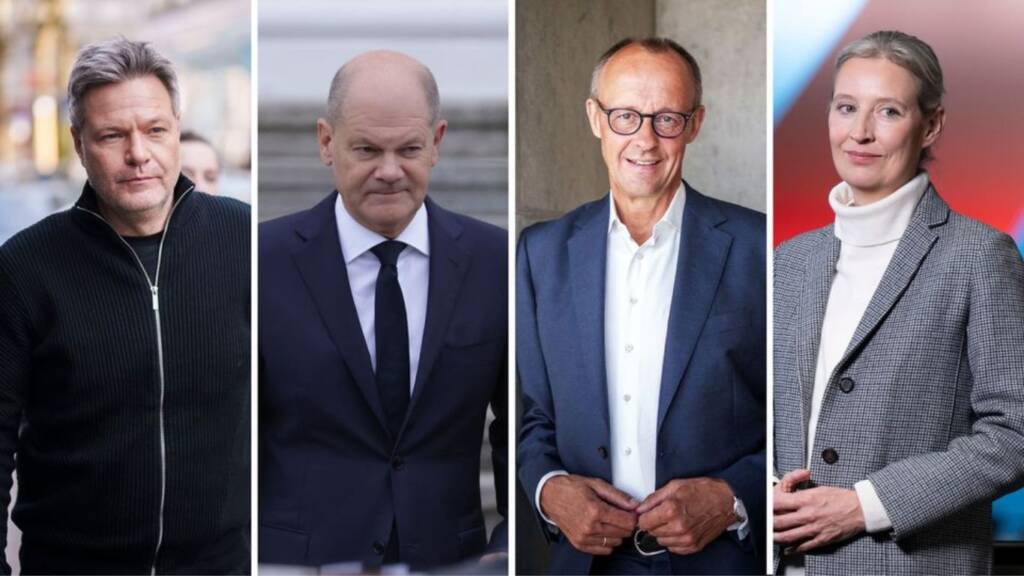The German election results are in, and they are nothing short of dramatic. Lindner’s party and Scholz’s SPD have suffered a crushing defeat. The Merz led CDU emerges as the largest party, but the real headline is the meteoric rise of AfD. With a massive 150-seat haul, AfD is now the ultimate Kingmaker, forcing Europe’s political elite into a dilemma.
Friedrich Merz, CDU’s chancellor candidate, campaigned on the promise of crushing the left. Also, he did. Yet, with his 208-seat victory, he now faces an impossible choice. To govern, he must either break his pledge or risk political suicide, he needs a coalition.
The irony is stark—Merz has also sought to desert AfD, but now his fate rests in their hands. Let’s talk about the German election results first. In the recent German federal elections held on February 23, 2025, the centre-right Christian Democratic Union (CDU) and its Bavarian sister party, the Christian Social Union (CSU), led by Friedrich Merz, emerged as the leading force, securing approximately 28.5% of the vote.
This result, while positioning the CDU/CSU as the largest bloc in the Bundestag, fell short of an absolute majority, necessitating coalition negotiations to form a stable government.
SPD wiped out
A notable development in this election was the significant surge of the far-right Alternative for Germany (AfD), which garnered about 21% of the vote, marking its strongest performance to date.
The AfD’s rise reflects a considerable shift in the German political landscape, with increased support in both traditional strongholds and new regions.
The Social Democratic Party (SPD) experienced a decline, obtaining less than 20% of the vote, its poorest showing since the late 19th century. This downturn underscores the challenges faced by centrist parties in the current political climate.
Voter turnout was notably high, reaching 84%, the highest since reunification in 1990, indicating robust public engagement in the electoral process. In his post-election address, Friedrich Merz emphasized the need for Europe to achieve greater independence from the United States, advocating for enhanced European unity and self-reliance.
Merz expressed intentions to form a coalition government promptly, aiming for completion by Easter, to address pressing issues such as economic stagnation, high energy prices, and infrastructure development.
Despite emerging as the largest party, the CDU/CSU’s inability to secure an outright majority necessitates coalition partnerships. Potential alliance talks are now about to begin and wait a minute, CDU appears to be in a mood of fooling Germans big time.
Merz is here to support SPD?
As per reports, talks with SPD are under consideration, though the SPD’s diminished vote share presents challenges in forming a stable coalition.
But one must not forget that for Merz, Scholz was the bag he kept on punching during the campaign. During the 2025 German election campaign, the CDU, led by Friedrich Merz, repeatedly criticized Chancellor Olaf Scholz and his coalition.
On the economy, Merz blamed Scholz for Germany’s financial struggles, arguing that excessive spending worsened economic instability. The CDU also pointed to the collapse of Scholz’s “traffic light” coalition as proof of weak governance and internal discord.
Regarding migration and security, Merz attacked Scholz’s lenient policies, insisting that they contributed to rising societal challenges. He pushed for stricter measures to control immigration and maintain security.
The CDU also took aim at Scholz’s foreign policy, particularly his reluctance to send Taurus missiles to Ukraine. They labeled him indecisive, claiming his hesitation weakened Germany’s commitment to European security. Overall, the CDU framed Scholz’s leadership as ineffective and unstable, using these key issues to challenge him throughout the election campaign.
And now, with his shot at the chancellorship slipping away, the so-called “Merkel party” is once again flirting with the idea of joining forces with the SPD. Wow, just wow. If this isn’t fooling the public, what is?
Suicidal Move
Merz talked tough on migration, echoing AfD rhetoric, yet completely ruled out working with them. So, what’s his plan? Another unstable coalition that drags Germany into more chaos? He refuses to listen to the growing voter frustration and instead clings to the same old political games.
The CDU had a chance to offer real change but is now retreating into old habits. If they go down this road again, by the next election, Germany will completely wipe out the existing parties. The people are watching, and they won’t be fooled forever.
Merz must realize that voters demanded change—not for Merkel’s legacy to return and hand Olaf Scholz the driver’s seat of Germany again. If the CDU chooses another backroom deal over real leadership, they’ll only accelerate their own downfall.
